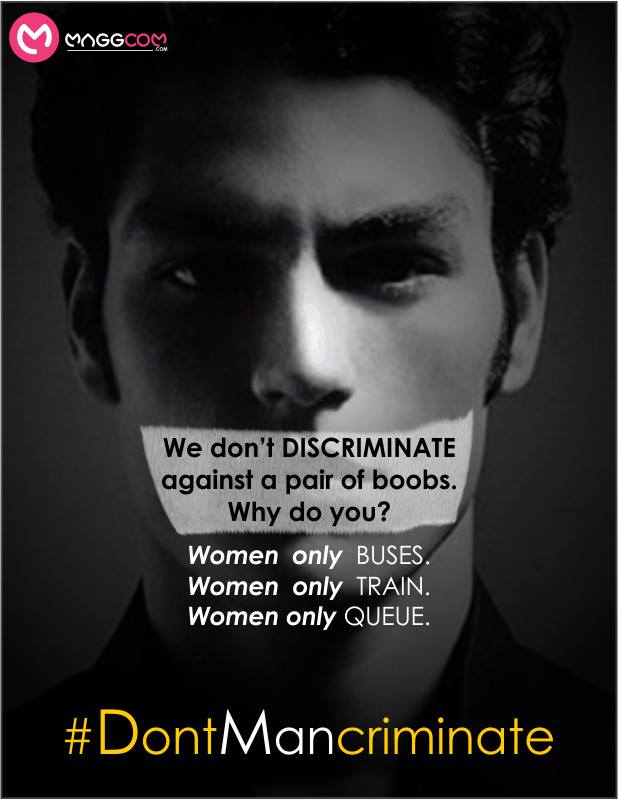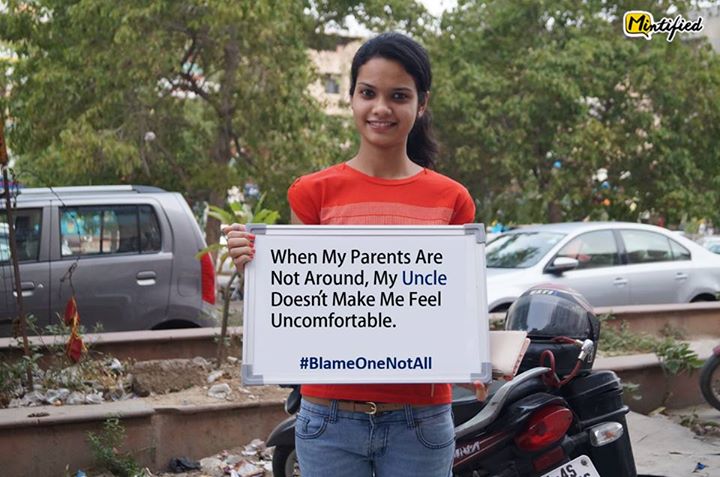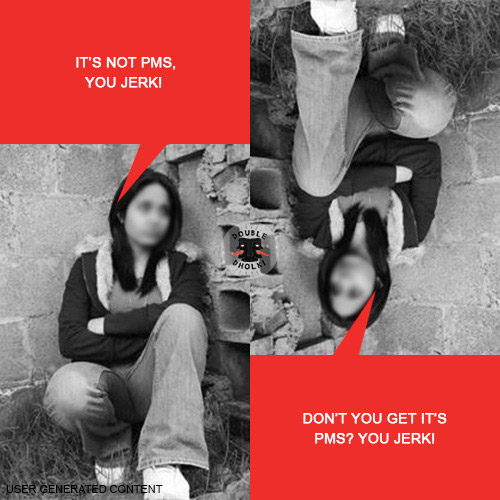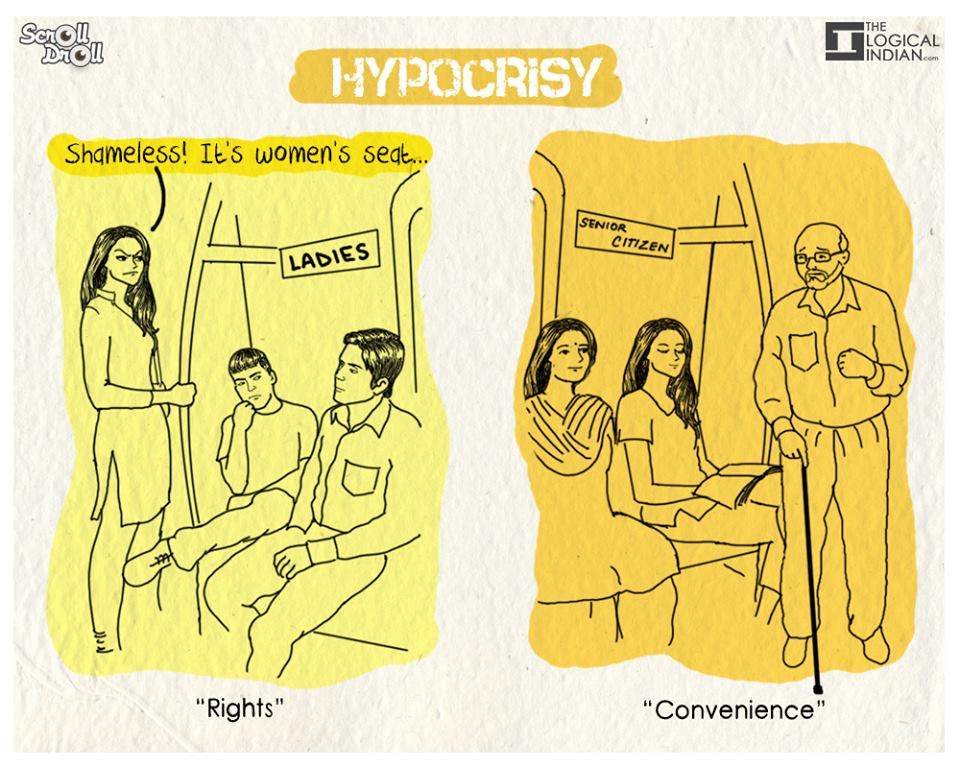In June this year, the online Indian lifestyle magazine Maggcom put up a series of posts on what it sees as widespread misandry in Indian society. It started a hashtag, #DontMancriminate, and launched a campaign lamenting the terrible state of men in today’s world where feminists are stomping on their rights.
As part of the campaign, the site uploaded posters with slogans slapped across the faces of Hollywood celebrities decrying the poor treatment of men. One of these questioned why men are discriminated against when they don’t harbour any prejudice against “a pair of boobs”. “This is to remind us of the forgotten gender, who, regardless of the situation, are expected to be such gentlemen,” the site says.
As a portmanteau, #DontMancriminate seems to draw inspiration from meninism, a hashtag that went viral in 2013 as a backlash against feminism. Sometimes called menimism to better rhyme with feminism or manism, the movement rued the loss of a man’s world where women are moving into positions of power and men can no longer treat them as objects for sexual assault. You want equality, meninists ask? Well, who’s going to open the door for you now?
If everything about the Indian version of the campaign, from its clumsy combination of “man” and “discrimination” to its references to ostensible double standards in gender norms, seem familiar, it’s because we have seen it before.
Men’s rights
In late May, the online portal Mintified launched a hashtag called #BlameOneNotAll.
About the same time, the Mumbai Mirror launched a campaign to expose “Double Dholkis” – people who say one thing and do another. It threw open the campaign for contributions and got many images, including this inexplicable one:
In April, a set of posters titled Hypocrisy tried to underline the same thing, adding to the surreal sense that many people in India are out of touch with reality. The popular Facebook group called The Logical Indian, along with ScrollDroll, a website that among other things hosts illustrations of commenting on contemporary Indian life, presented what they called “the hypocrisy prevalent amongst the educated and so-called modern & intellectual society”.
Going by congratulatory comments all of the above platforms received, they all clearly know their audience.
The globalised misogynist
Forget for a moment that, despite the flawed logic, some of the stereotypes these campaigns call terrible are exactly what feminism has been yelling hoarse about for decades. Forget for a moment even the context which they ignore. (India is a country where female foeticide is rampant and the sex ratio terribly skewed towards males.)
That these campaigns and posters have received congratulatory comments isn’t surprising. The comment section, on most sites, is an anthology of vitriol and misogynistic diatribe. But when did Indian internet users discard their regular arsenal of misogynistic insults in Indian languages and pick up Americanised vocabulary such as meninism and mancriminate?
That’s where the curious phenomenon of the Indian Men’s Rights Activist comes in.
MRAs, as they are known globally, are people who believe that feminism will emasculate the world if left unchallenged. What better way to combat the fears of societies where women will no longer be available to make dinner than a campaign that matches feminism in name, if not deed?
In India, the more serious MRAs stand against what they see as vindictive applications of laws against dowry and sexual abuse. The ones not as ideologically involved produce posters instead.
These campaigns and the reactions to them seem to be distressed responses to a feminist movement that for all its flaws is unabashedly vocal online. Those who see feminism as a form of misandry or simply disagree with the notion of gender equality need a vocabulary to express this frustration.
And with forums such as Reddit, which, despite its strengths, is the place trolls go to hang out, the transfer of vocabulary becomes easier. Over the last few years, the tired misogynist jokes that circulate in airless old forums (“Women belong in the kitchen”, “Woman, make me a sandwich”, “Why does feminism only talk about women’s rights? What about men?”) seems to have filtered across to Indian users.
Given all of that, it is no wonder that the creators of #DontMancriminate expected to be taken seriously. But Twitter responded to them the way they should have. With a joke.
As part of the campaign, the site uploaded posters with slogans slapped across the faces of Hollywood celebrities decrying the poor treatment of men. One of these questioned why men are discriminated against when they don’t harbour any prejudice against “a pair of boobs”. “This is to remind us of the forgotten gender, who, regardless of the situation, are expected to be such gentlemen,” the site says.


As a portmanteau, #DontMancriminate seems to draw inspiration from meninism, a hashtag that went viral in 2013 as a backlash against feminism. Sometimes called menimism to better rhyme with feminism or manism, the movement rued the loss of a man’s world where women are moving into positions of power and men can no longer treat them as objects for sexual assault. You want equality, meninists ask? Well, who’s going to open the door for you now?
If everything about the Indian version of the campaign, from its clumsy combination of “man” and “discrimination” to its references to ostensible double standards in gender norms, seem familiar, it’s because we have seen it before.
Men’s rights
In late May, the online portal Mintified launched a hashtag called #BlameOneNotAll.

About the same time, the Mumbai Mirror launched a campaign to expose “Double Dholkis” – people who say one thing and do another. It threw open the campaign for contributions and got many images, including this inexplicable one:

In April, a set of posters titled Hypocrisy tried to underline the same thing, adding to the surreal sense that many people in India are out of touch with reality. The popular Facebook group called The Logical Indian, along with ScrollDroll, a website that among other things hosts illustrations of commenting on contemporary Indian life, presented what they called “the hypocrisy prevalent amongst the educated and so-called modern & intellectual society”.

Going by congratulatory comments all of the above platforms received, they all clearly know their audience.
The globalised misogynist
Forget for a moment that, despite the flawed logic, some of the stereotypes these campaigns call terrible are exactly what feminism has been yelling hoarse about for decades. Forget for a moment even the context which they ignore. (India is a country where female foeticide is rampant and the sex ratio terribly skewed towards males.)
That these campaigns and posters have received congratulatory comments isn’t surprising. The comment section, on most sites, is an anthology of vitriol and misogynistic diatribe. But when did Indian internet users discard their regular arsenal of misogynistic insults in Indian languages and pick up Americanised vocabulary such as meninism and mancriminate?
That’s where the curious phenomenon of the Indian Men’s Rights Activist comes in.
MRAs, as they are known globally, are people who believe that feminism will emasculate the world if left unchallenged. What better way to combat the fears of societies where women will no longer be available to make dinner than a campaign that matches feminism in name, if not deed?
In India, the more serious MRAs stand against what they see as vindictive applications of laws against dowry and sexual abuse. The ones not as ideologically involved produce posters instead.
These campaigns and the reactions to them seem to be distressed responses to a feminist movement that for all its flaws is unabashedly vocal online. Those who see feminism as a form of misandry or simply disagree with the notion of gender equality need a vocabulary to express this frustration.
And with forums such as Reddit, which, despite its strengths, is the place trolls go to hang out, the transfer of vocabulary becomes easier. Over the last few years, the tired misogynist jokes that circulate in airless old forums (“Women belong in the kitchen”, “Woman, make me a sandwich”, “Why does feminism only talk about women’s rights? What about men?”) seems to have filtered across to Indian users.
Given all of that, it is no wonder that the creators of #DontMancriminate expected to be taken seriously. But Twitter responded to them the way they should have. With a joke.
@RegaJha @TheRestlessQuil U WANT GENDER EQUALITY? TAKE IT. MANSPREAD. MANSPLAIN. MANDOLIN. just #DontMancriminate
— Rosie Roti (@supriyan) July 9, 2015Limited-time offer: Big stories, small price. Keep independent media alive. Become a Scroll member today!
Our journalism is for everyone. But you can get special privileges by buying an annual Scroll Membership. Sign up today!